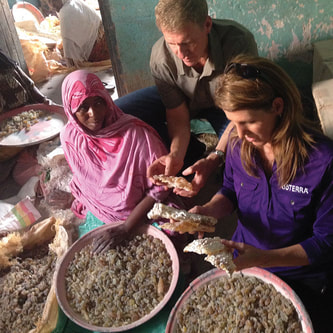Cō-Impact Sourcing® Frankincense
The doTERRA Co-Impact Sourcing Initiative in Somalia provides frankincense harvesters with greater opportunities for income, while providing doTERRA with access to skilled harvesters who help accomplish the intricate steps of frankincense resin harvesting.
Frankincense in Somalia
For thousands of years, frankincense resins have been harvested in Somalia from wild Boswellia trees like Carterii and Frereana. Boswellia carterii trees typically grow best in sandy soil, producing small resin tears. The resin tears from the Carterii species are some of the most commonly harvested types of resin, and usually have a very round shape. Unlike the Carterii trees, Frereana trees do not thrive on sandy soil, but need a dry, rocky climate to produce the largest resin of the Boswellia species.
Frankincense Harvesters
Harvesting Frankincense resin is a delicate process that requires careful planning and precise skill and takes over five months to complete the process. Frankincense harvesters must travel long distances, leaving their families and communities behind. They often live in caves along the way as they harvest frankincense resins from remote locations. Once the tears are harvested, the resin is carefully cleaned, separated, and organised (by size and color) typically by women.
Despite the lengthy and difficult harvesting process, harvesters are often unable to sell their frankincense resins for a fair price. Because of the intense harvesting process and the lack of adequate payment, a large portion of the available frankincense trees in Somalia have not been harvested.
doTERRA Co-Impact Sourcing Initiative in Somalia
The doTERRA Co-Impact Sourcing Initiative provides frankincense harvesters with fair wages and on-time payments (including food and cash prepayments spread out during the year) by working around the layers of middlemen and instead working directly with those who harvest and sort the frankincense. This arrangement provides a much more stable and reliable income to frankincense harvesters. doTERRA is also working with our partners to ensure that the cleaning and sorting of the frankincense resins takes place as close to the harvesting locations as possible so that these important jobs (typically held by women) remain in rural areas where they are most needed and benefit the harvesting families. Our initiative also ensures that these women receive fair wages and that they are able to work in more favorable working conditions. Along with these sustainable sourcing efforts, the doTERRA Healing Hands Foundation™ has also funded the construction of two new schools for hundreds of students from harvester clans.
